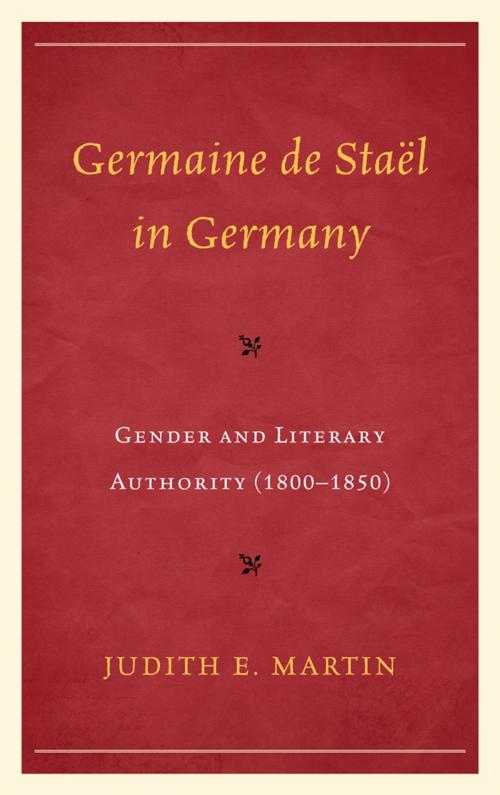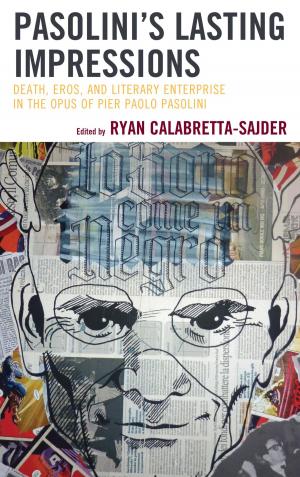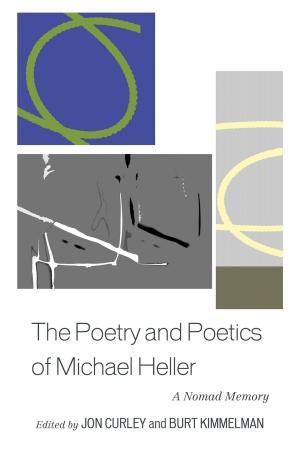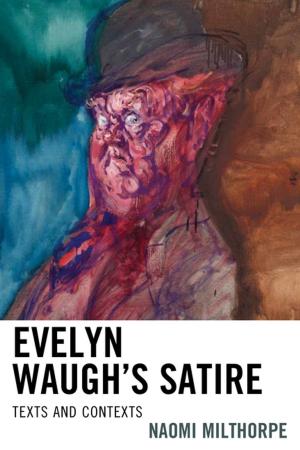Germaine de Staël in Germany
Gender and Literary Authority (1800–1850)
Fiction & Literature, Literary Theory & Criticism, European, German, Women Authors| Author: | Judith E. Martin | ISBN: | 9781611470352 |
| Publisher: | Fairleigh Dickinson University Press | Publication: | May 12, 2011 |
| Imprint: | Fairleigh Dickinson University Press | Language: | English |
| Author: | Judith E. Martin |
| ISBN: | 9781611470352 |
| Publisher: | Fairleigh Dickinson University Press |
| Publication: | May 12, 2011 |
| Imprint: | Fairleigh Dickinson University Press |
| Language: | English |
Germaine de Staël and German Women: Gender and Literary Authority (1800-1850) investigates Staël's significance as an icon of female artistic genius and political engagement for two generations of German women, including Caroline A. Fischer, Caroline Pichler, Johanna Schopenhauer, Bettina von Arnim, Ida Hahn-Hahn, and Luise Mühlbach. These authors drew a significant impetus from Staël's exemplary life and writings, especially her influential novels of political and artistic heroines, Delphine (1802) and Corinne, or Italy (1807), referring to them in order to authorize their own discourses on art and politics, and to buttress their identity as writers in a period when female authorship generated intense controversy. Taking references to Staël and her texts as a starting point opens fresh perspectives on German women's novels, while at the same time revealing their authors' participation in the broader European women's literary tradition. Whereas several novels from the first decade of the century echo Delphine by uniting domestic fiction with political themes, Staël's epoch-making novel of female poetic genius, Corinne, left a more lasting literary legacy in a tradition of German female artist novels. Corinne exemplified the creative woman's dilemma between fame and love, and subsequent German novelists explore this conflict, while several also emulate Staël's myth-making in Corinne as a strategy for attributing transcendent genius to their heroines. Reading for subtexts of female self-expression and development brings to light counter-narratives of female creative transcendence, often evoked through allusions to mythological figures. Martin suggests a revision of German literary history by uncovering a neglected tradition of artist novels positioned between the German Künstlerroman and Staël's newly inaugurated international dialogue on women's role in public culture.
Germaine de Staël and German Women: Gender and Literary Authority (1800-1850) investigates Staël's significance as an icon of female artistic genius and political engagement for two generations of German women, including Caroline A. Fischer, Caroline Pichler, Johanna Schopenhauer, Bettina von Arnim, Ida Hahn-Hahn, and Luise Mühlbach. These authors drew a significant impetus from Staël's exemplary life and writings, especially her influential novels of political and artistic heroines, Delphine (1802) and Corinne, or Italy (1807), referring to them in order to authorize their own discourses on art and politics, and to buttress their identity as writers in a period when female authorship generated intense controversy. Taking references to Staël and her texts as a starting point opens fresh perspectives on German women's novels, while at the same time revealing their authors' participation in the broader European women's literary tradition. Whereas several novels from the first decade of the century echo Delphine by uniting domestic fiction with political themes, Staël's epoch-making novel of female poetic genius, Corinne, left a more lasting literary legacy in a tradition of German female artist novels. Corinne exemplified the creative woman's dilemma between fame and love, and subsequent German novelists explore this conflict, while several also emulate Staël's myth-making in Corinne as a strategy for attributing transcendent genius to their heroines. Reading for subtexts of female self-expression and development brings to light counter-narratives of female creative transcendence, often evoked through allusions to mythological figures. Martin suggests a revision of German literary history by uncovering a neglected tradition of artist novels positioned between the German Künstlerroman and Staël's newly inaugurated international dialogue on women's role in public culture.















